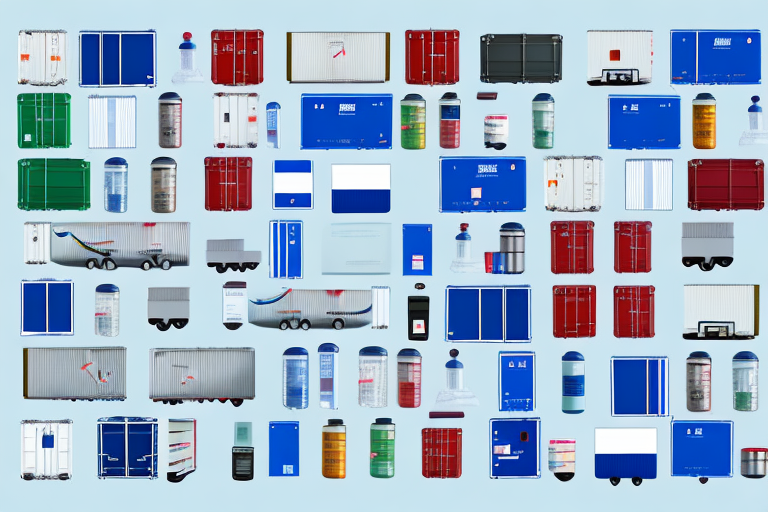Discovering the Best Medical Shipping Companies for Your Needs
The healthcare industry relies heavily on medical shipping companies to transport vital medical supplies and equipment. However, choosing the right medical shipping company can be a daunting task. This article provides in-depth insights into the factors to consider when selecting a medical shipping company and highlights the top 10 companies to watch out for.
Why Medical Shipping Companies are Important for the Healthcare Industry
Medical shipping companies play a crucial role in the healthcare sector by ensuring that essential medical supplies and equipment are delivered to hospitals, clinics, laboratories, and other healthcare facilities. These companies utilize specialized vehicles, packaging materials, and handling protocols to ensure that medical shipments are transported safely, securely, and in compliance with industry regulations.
One of the key benefits of using medical shipping companies is their ability to offer a range of shipping options tailored to meet the specific needs of healthcare providers. For example, some companies provide same-day or next-day delivery for urgent medical supplies, while others offer temperature-controlled shipping for sensitive materials like vaccines and blood products.
In addition to their shipping services, many medical shipping companies also offer value-added services such as inventory management, order tracking, and customized reporting. These services help healthcare providers streamline their supply chain operations and improve overall efficiency, leading to better patient outcomes.
Factors to Consider When Choosing a Medical Shipping Company
When selecting a medical shipping company, consider the following factors:
1. Experience and Expertise
The company should have extensive experience in handling medical shipments and demonstrate a thorough understanding of industry-specific regulations.
2. Quality Control
Ensure that the company has a robust quality control program in place to guarantee that shipments are delivered intact and on time.
3. Carrier Network and Rates
A wide network of carrier partners and the ability to offer competitive rates are essential for efficient shipping operations.
4. Customer Service
The company should have a dedicated customer service team available 24/7 to address any questions or concerns. Additionally, they should provide real-time tracking information for shipments.
5. Reputation and Reliability
Investigate the company's reputation by reading reviews and testimonials from other medical professionals. A company with a strong reputation for reliability and professionalism is more likely to deliver medical shipments safely and on time.
Top 10 Medical Shipping Companies You Should Know About
There are numerous medical shipping companies in the market, but the following ten stand out due to their experience, quality control measures, carrier networks, and track record of successful medical shipments:
- UPS Healthcare
- DHL Medical Express
- FedEx Custom Critical
- DB Schenker Life Sciences
- CSafe Global
- Bio Pharma Logistics
- World Courier
- Quick International Courier
- Marken
- WDSrx - Woodfield Distribution, LLC
When choosing a medical shipping company, consider factors such as temperature control, security, and compliance with regulations. Many of these top companies offer specialized services like cold chain logistics, hazardous materials handling, and customs clearance. It is also important to select a company with a global network, as medical shipments often need to cross borders. By selecting one of these top 10 medical shipping companies, you can ensure that your medical products are transported safely and efficiently.
Understanding the Unique Challenges of Shipping Medical Supplies and Equipment
Shipping medical supplies and equipment presents unique challenges due to their fragility, perishability, and strict regulatory requirements. Medical shipments may include pharmaceuticals, biological specimens, diagnostic kits, medical implants, and medical devices, among others. Additionally, medical shipments may require specialized temperature controls, security measures, and customs clearance procedures.
Ensuring Safe and Secure Transportation
One of the primary challenges in shipping medical supplies and equipment is ensuring that they are transported safely and securely. This requires careful planning and coordination between all parties involved in the shipping process, including the shipper, carrier, and receiver. Choosing a carrier with experience in handling medical shipments and the necessary equipment and expertise is crucial for ensuring that shipments arrive at their destination in good condition.
Compliance with Regulations
Another significant challenge is complying with the various regulations and guidelines that govern the transportation of medical items. These regulations may vary depending on the type of shipment, destination country, and mode of transportation. Staying up-to-date with these regulations and partnering with a knowledgeable shipping company is essential for navigating the complex regulatory landscape.
For more information on regulations for medical shipments, refer to the FDA Guidelines for Drug Shippers and Recipients.
The Importance of Compliance and Safety in Medical Shipping
Medical shipping companies have a responsibility to comply with industry regulations and ensure the safety of medical shipments. Common regulatory requirements for medical shipments include Good Distribution Practices (GDP), Good Manufacturing Practices (GMP), International Air Transport Association (IATA) regulations, and Country-Specific regulations. These regulations ensure that medical shipments are transported in a manner that preserves their efficacy, integrity, and quality.
In addition to complying with industry regulations, medical shipping companies must prioritize safety measures to prevent accidents and protect the well-being of those handling the shipments. This includes proper packaging and labeling of hazardous materials, training for employees on handling and transporting medical shipments, and regular maintenance and inspection of shipping equipment. By prioritizing compliance and safety, medical shipping companies can ensure that patients receive the necessary medical supplies and equipment in a timely and safe manner.
How to Ensure Your Medical Shipment Arrives on Time and Intact
To ensure that your medical shipment arrives on time and intact, it is essential to work with a reputable medical shipping company that has proven experience in handling medical shipments. Additionally, ensure that your shipment is properly packaged and labeled, and that all necessary documentation is in order. Finally, track your shipment throughout its journey to stay updated on its status and anticipate any potential issues.
Temperature Control
Another critical factor to consider when shipping medical supplies is maintaining the appropriate temperature control during transportation. Many medical products, such as vaccines and medications, require specific temperature ranges to maintain their effectiveness. Working with a shipping company that can monitor and regulate the temperature of your shipment throughout its journey is essential to ensure that your medical supplies arrive at their destination in the same condition as when they were shipped.
Tips on Negotiating Rates with Medical Shipping Companies
When negotiating rates with medical shipping companies, consider the following factors:
- Volume: Higher shipment volumes often qualify for discounts.
- Frequency: Regular shipping schedules may result in better rates.
- Shipment Size: Larger shipments might receive bulk pricing benefits.
- Distance: Shipping distances can significantly impact costs.
- Mode of Transportation: Choosing the appropriate mode (air, ground, etc.) can affect pricing.
- Delivery Speed: Faster delivery options typically cost more.
Additionally, be prepared to ask for discounts or other cost-saving measures based on your specific needs. Ensure that the rates you negotiate are competitive and transparent, with no hidden fees or surcharges. It's also beneficial to review multiple quotes from different companies to make an informed decision.
Case Studies: Successful Medical Shipment Deliveries
Numerous examples highlight the success of reputable medical shipping companies:
UPS Healthcare and COVID-19 Vaccine Delivery
In December 2020, UPS Healthcare successfully delivered 30,000 vials of the COVID-19 vaccine from Belgium to Chicago, ensuring timely vaccination efforts amidst the pandemic.
DHL Medical Express and Test Kit Delivery
In May 2020, DHL Medical Express delivered 168 pallets of COVID-19 test kits from South Korea to the US, facilitating critical testing for healthcare workers and patients.
FedEx Medical Solutions and PPE Distribution
FedEx Medical Solutions played a crucial role in delivering over 100,000 isolation gowns and masks to New York City hospitals in April 2020, addressing severe shortages of personal protective equipment (PPE) for healthcare workers during the peak of the pandemic. Additionally, FedEx partnered with Direct Relief to deliver medical supplies to areas affected by natural disasters like hurricanes and wildfires.
The Future of Medical Shipping: Trends and Innovations to Watch Out For
The medical shipping industry is continually evolving, with emerging trends, technologies, and innovations shaping its future. Key trends and innovations to watch include:
1. Drone Deliveries
Drones are increasingly being used for remote area deliveries, providing rapid and efficient transportation of medical supplies, especially in areas with limited infrastructure.
2. Blockchain-Based Tracking Systems
Blockchain technology offers enhanced transparency and security in tracking shipments, reducing the risk of fraud and ensuring the authenticity of medical products.
3. IoT-Enabled Temperature Monitoring
The Internet of Things (IoT) allows for real-time temperature monitoring, ensuring that temperature-sensitive medical products are maintained within required ranges throughout transportation.
4. Predictive Analytics
Predictive analytics leverages data-driven insights to forecast potential disruptions in the supply chain, enabling proactive measures to maintain timely deliveries.
5. Autonomous Vehicles
Autonomous vehicles, such as self-driving trucks and vans, are being developed and tested to revolutionize the industry. These vehicles can operate 24/7, reducing delivery times and costs while improving safety by minimizing human error. Equipped with advanced sensors and monitoring systems, autonomous vehicles ensure that medical shipments are transported under optimal conditions.
These advancements are expected to improve the efficiency, safety, and transparency of medical shipping, benefiting both shippers and recipients.
How to Avoid Common Mistakes When Selecting a Medical Shipping Company
To avoid common mistakes when selecting a medical shipping company, follow these guidelines:
- Research Thoroughly: Investigate potential companies' backgrounds, services, and compliance history.
- Ask for References and Credentials: Request references from other healthcare providers and verify the company's credentials and certifications.
- Read Reviews: Check reviews and testimonials from previous customers to gauge the company's reliability and quality of service.
- Assess Experience and Expertise: Ensure the company has experience handling your specific type of medical shipment and is knowledgeable about relevant regulations.
- Verify Compliance: Confirm that the company complies with all pertinent industry regulations and standards.
Comparing Domestic vs International Medical Shipping Options
When comparing domestic versus international medical shipping options, several factors come into play:
Regulatory Compliance
International medical shipments often require more stringent regulatory compliance and customs clearance procedures, making them more complex and time-consuming than domestic shipments.
Temperature Controls and Packaging
International medical shipments may necessitate specialized temperature controls and packaging to withstand long-distance transport, ensuring that medical products remain effective upon arrival.
Additional Fees and Surcharges
International shipments may be subject to additional fees and surcharges, such as customs duties and taxes, which need to be considered when budgeting for shipping costs.
Selecting the appropriate shipping option depends on the specific requirements of your medical shipments, including the nature of the products, destination, urgency, and budget constraints.
Benefits of Outsourcing Your Medical Shipping Needs to a Third-Party Logistics Provider (3PL)
Outsourcing your medical shipping needs to a third-party logistics provider (3PL) offers several benefits, including:
- Cost Savings: 3PLs can leverage their network and expertise to offer competitive rates and reduce shipping costs.
- Specialized Expertise: 3PLs have specialized knowledge and experience in handling medical shipments, ensuring compliance and efficiency.
- Improved Efficiency: By managing the entire shipping process, from packaging and labeling to tracking and delivery, 3PLs streamline operations and free up your resources to focus on core business activities.
- Scalability: 3PLs can easily scale their services to accommodate fluctuating shipping volumes and evolving business needs.
Partnering with a reputable 3PL can enhance your supply chain operations, ensuring that your medical shipments are managed effectively and arrive at their destinations safely and on time.
How to Evaluate the Reputation and Track Record of a Medical Shipping Company
To evaluate the reputation and track record of a medical shipping company, consider the following aspects:
- Years of Experience: Companies with a long history in the industry are more likely to have established reliable practices.
- Industry Partnerships and Affiliations: Partnerships with reputable organizations indicate a company's standing in the industry.
- Customer References and Testimonials: Positive feedback from previous clients suggests a company's reliability and quality of service.
- Success Stories and Case Studies: Detailed case studies showcasing the company's ability to handle complex shipments can provide valuable insights.
- Quality Control Measures: Robust quality control protocols indicate the company's commitment to maintaining high service standards.
- Regulatory Compliance Programs: Ensuring adherence to industry regulations is crucial for safe and legal transport of medical shipments.
- Carrier Network: A comprehensive carrier network ensures flexibility and reliability in shipping operations.
Researching these factors will help you assess whether a medical shipping company can meet your specific needs and maintain the quality and safety of your medical shipments.
In conclusion, choosing the right medical shipping company is a critical decision that requires careful consideration of several factors. By following the tips and insights provided in this article, you can confidently select a medical shipping company that meets your specific needs and delivers your medical supplies and equipment safely, securely, and on time.




















